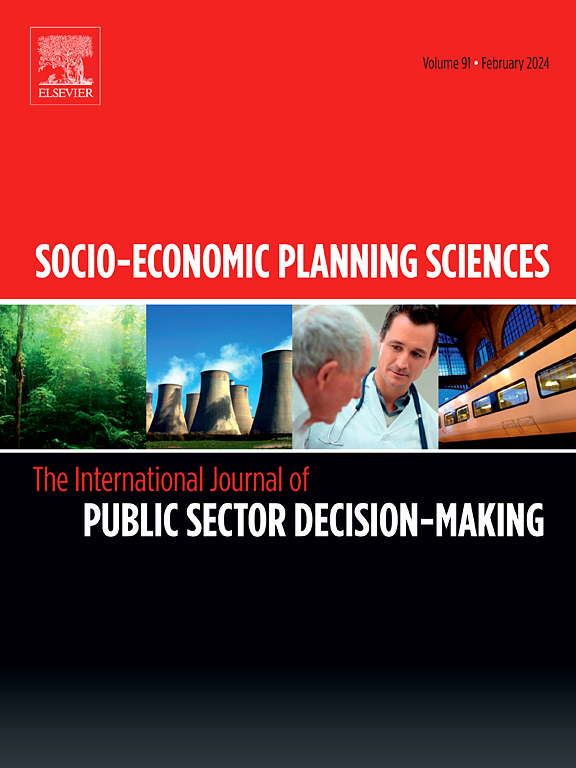基于信任度的奖惩机制下考虑交货时间的绿色电子商务供应链分析
IF 5.4
2区 经济学
Q1 ECONOMICS
引用次数: 0
摘要
电子商务的快速发展和人们对绿色消费需求的不断增长,推动了绿色电子商务供应链的发展,这对电子商务平台销售的绿色产品的实际交货时间与承诺交货时间存在差异提出了新的挑战。由于市场环境的不确定性,我们没有足够的相关数据来推断对绿色新产品的需求。因此,考虑到消费者对配送时间差的感知,我们运用不确定性理论,在两种途径(无激励、消费者激励)和两种电子商务销售模式(批发销售模式、平台销售模式)的四种组合场景下,研究绿色电子商务供应链的定价与销售模式选择问题。与期望效用最大化不同,我们假设电子商务平台和绿色制造商在需求不确定的情况下,以一定置信度下的绿色度和交货时间差为目标追求利润最大化,并以此为基础构建了两个集中式模型和四个Stackelberg分散模型。结果表明,供应链成员对销售模式的选择与风险态度相关。此外,承诺交付时间对负责产品交付的供应链成员的最优盈利能力的影响与奖惩机制下消费者激励的强弱有关。更重要的是,消费者奖惩机制的引入可以有效提高产品的绿色度、配送效率、供应链成员的最优利润和社会福利。本文章由计算机程序翻译,如有差异,请以英文原文为准。
Analysis of green e-commerce supply chain considering delivery time under reward–penalty mechanism based on confidence level
The rapid growth of e-commerce and the increasing demand for green consumption are spurring the development of the green e-commerce supply chain, which poses new challenges, including the discrepancy between actual and promised delivery time of green products sold on e-commerce platforms. Due to the indeterminates in the market environment, we do not have sufficient relevant data to deduce the demand for new green products. Therefore, considering the consumer’s perception of the delivery time difference, we investigate the pricing and sales mode selection problem of the green e-commerce supply chain using uncertainty theory under four combination scenarios of two approaches (no incentives, consumer incentives) and two e-commerce sales modes (wholesale sales mode, platform sales mode). Instead of expected utility maximization, we assume that an e-commerce platform and a green manufacturer seek to maximize profits under uncertain demand based on greenness and delivery time difference with a certain confidence level, from which two centralized models and four Stackelberg decentralized models are constructed. The results show that supply chain members’ choice of sales mode is associated with risk attitude. In addition, the impact of promised delivery time on the optimal profitability of the supply chain member who is responsible for product delivery is related to the strength of consumer incentives under the reward and penalty mechanism. More importantly, the introduction of the consumer reward and penalty mechanism can effectively improve the greenness of products, the efficiency of delivery, the optimal profits of supply chain members and social welfare.
求助全文
通过发布文献求助,成功后即可免费获取论文全文。
去求助
来源期刊

Socio-economic Planning Sciences
OPERATIONS RESEARCH & MANAGEMENT SCIENCE-
CiteScore
9.40
自引率
13.10%
发文量
294
审稿时长
58 days
期刊介绍:
Studies directed toward the more effective utilization of existing resources, e.g. mathematical programming models of health care delivery systems with relevance to more effective program design; systems analysis of fire outbreaks and its relevance to the location of fire stations; statistical analysis of the efficiency of a developing country economy or industry.
Studies relating to the interaction of various segments of society and technology, e.g. the effects of government health policies on the utilization and design of hospital facilities; the relationship between housing density and the demands on public transportation or other service facilities: patterns and implications of urban development and air or water pollution.
Studies devoted to the anticipations of and response to future needs for social, health and other human services, e.g. the relationship between industrial growth and the development of educational resources in affected areas; investigation of future demands for material and child health resources in a developing country; design of effective recycling in an urban setting.
 求助内容:
求助内容: 应助结果提醒方式:
应助结果提醒方式:


